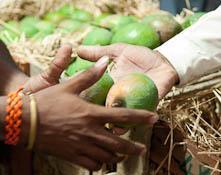
Quality control has been a problem for Indian mango exports, losing the country access to both the US and Japan until recently, but a new X-ray system from India’s Council for Scientific and Industrial Research (CSIR) could usher in a new era of quality standards.
CSIR launched the new non-destructive mango sorting technique at a two day education workshop in Chennai, part of a scheme of technology transfer to the fragmented Indian industry.
The new technique uses X-rays in a similar fashion to airport security scanners. Soft X-ray imaging picks out mangoes affected by the spongy tissue condition and seed weevil.
Both problems have caused market access problems for Indian mango exports in the past, reported FnB News.
“The X-ray imaging technology helps segregate the mangoes with deformities by processing the internal density of the fruit and thus will provide a fillip to the export industry,” said head of the project R Govindaraj.
The new technology could prove a boon to India, currently the world’s largest producer of mangoes. The country exports around 50,000 tonnes of the fruit annually.
“There is huge potential for expanding the export market. The technology can be used even in the local market and will benefit the consumers a lot,” said Vijay Mehta, vice-chancellor of Dr Balasaheb Sawant Konkan Krishi Vidyapeeth.
Each X-ray machine will cost about Rs3m, and the cost of processing each mango will be about Rs0.12. CSIR is working to drop the per-unit cost to less than Rs0.05.
“The business model is based on the fact that increased processing cost would be offset by access to a wider market and better pricing because of adherence to quality,” said Dr Chandra Shekhar, director of CSIR’s Central Electronics and Engineering Research Institute (CEERI) arm.



